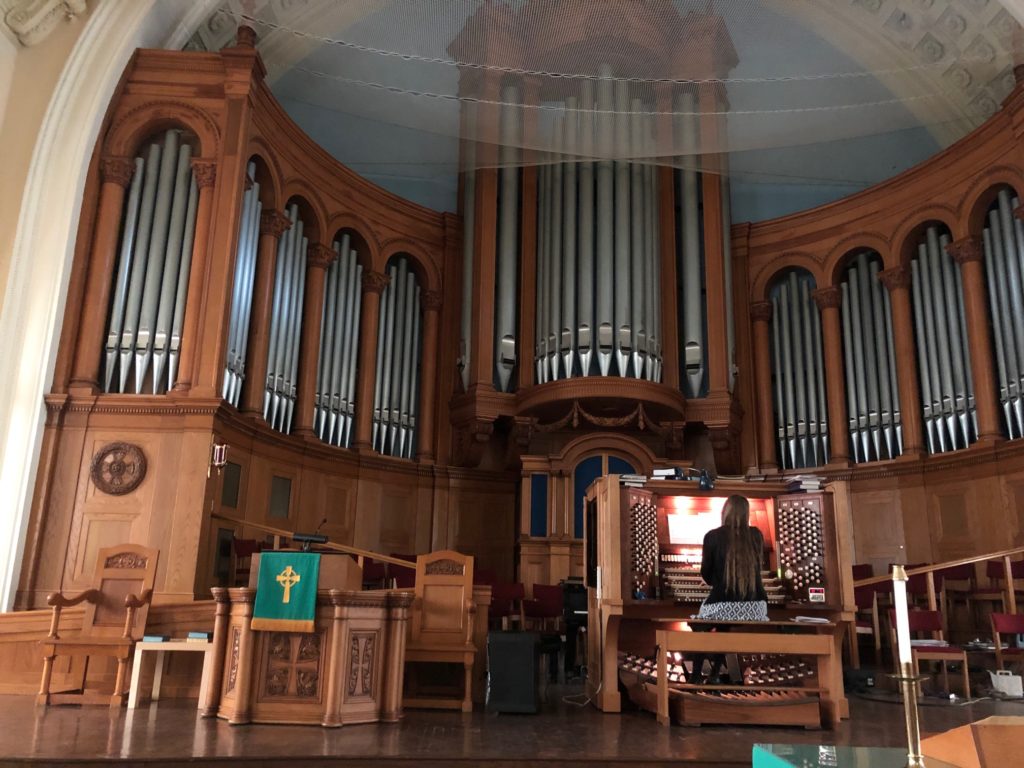Singing her own song: Where music and story merge
It’s the only instrument with a cockpit…
Isn’t it? I sweated this claim a little as I walked into the sanctuary of First Presbyterian Church, Ithaca and looked at the organ console. It stood in the center of the stage, its hundreds of buttons, stops, pedals and keys – four tiers of keys! – facing the gathering audience. To add to the impressive effect, little lights glowed here and there: red, green, white.
This certainly looks like a cockpit.
It mattered to me on Wednesday because I was about to read a poem, during a concert by my friend Anna Steppler, stating as much. In a moment of pre-performance jitters, I questioned the opening lines of my poem.
It’s the only instrument with a cockpit
and she knows how to fly it.
Not that I’d tried to rhyme “cockpit” with “fly it,” so much as the truth of the statement: is the organ indeed the only musical instrument played from such a comprehensive command center?
Violin? Harp? Trombone? Oboe, tuba, piano, timpani? Gamalan ensemble? Nope, I can’t think of another.
The organ is a singularly impressive instrument, and Anna is a master of it.

For Wednesday’s concert, “Singing Her Own Song,” Anna played five pieces, all by women. And all particularly story-like, seeming to convey story without words, among them:
- “Hourglass” by Florence Price (1887-1953). The music communicates not just the ticking of a clock but also the contented monotony of a lazy afternoon. Listening to it, I imagine dusk falling beyond the windows of a fussily decorated parlor, perhaps a dreamy child amusing herself while visiting an old aunt.
- “hell und dunkle” by Sofia Gubaidulina (b. 1931). In German, “hell und dunkle” means “light and dark,” but without that in mind, I can see how a listener might think of the place of transgression or punishment, perhaps as depicted in “Paradise Lost.” Impish glimmers of sound flutter through the music in a minor key, with low rumblings underneath and passages of pure sonic chaos. At one point, Anna used her whole arms up to the elbows to depress the keys. After several listens, though, this piece became my favorite on the program. The glimmering bits of sound start to show up as light in my imagination; the low pedal rumbles as darkness. The two contrasts meet and clash and play together. It’s a story of struggle and reconciliation… and ultimately triumph. As I watched Anna play it, I recalled her telling me that someone told her she was not capable of this piece. It was vindicating to witness her play it flawlessly on Wednesday.
- “Ancient Sunlight,” by Judith Bingham (b. 1952), a musical depiction of the life of Mary, mother of Jesus. It’s not all sweetness, and doesn’t get to the annunciation, when the angel appears to Mary, until the last of three movements. In other words, the piece portrays Mary as a full-fledged person before she became the mother of God.
Anna asked me and another friend, poet and priest Taylor Daynes, to give verbal reflections. Among the organ pieces, they appeared as songs without music. I guess that’s one way to describe poetry.
Taylor responded to “Ancient Sunlight” with a villanelle, a verse form that includes a refrain that cycles through the poem. She noted that she’d also written with Florence Price’s “Hourglass” and its clocklike melodic repetitions in mind.
I responded most specifically to “hell und dunkle” by thinking literally : sound waves produced by the organ’s hundreds of pipes disturb our molecules, making sound, the way the music disturbs our hearts and imaginations, making story.
Even though I’d determined that the organ is, indeed, the only instrument with a cockpit, I was uncertain about my contribution. I don’t know if the poem stands up on the page, but it was fun to read, to fill the vaulted space of the sanctuary with my voice after the organ’s hundreds of voices had shattered the space moments before, then put it back together again.